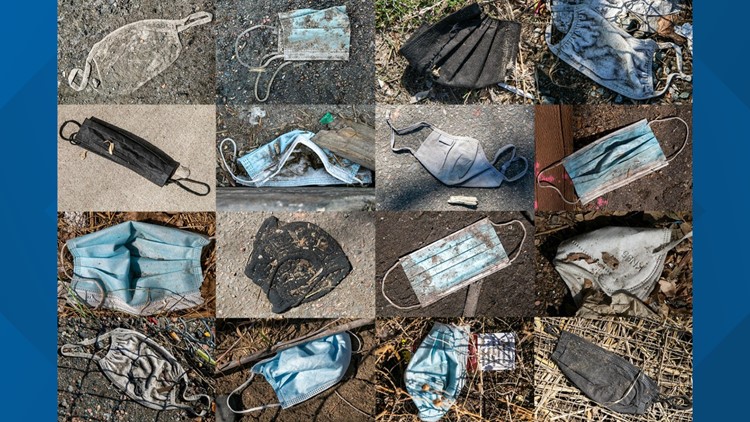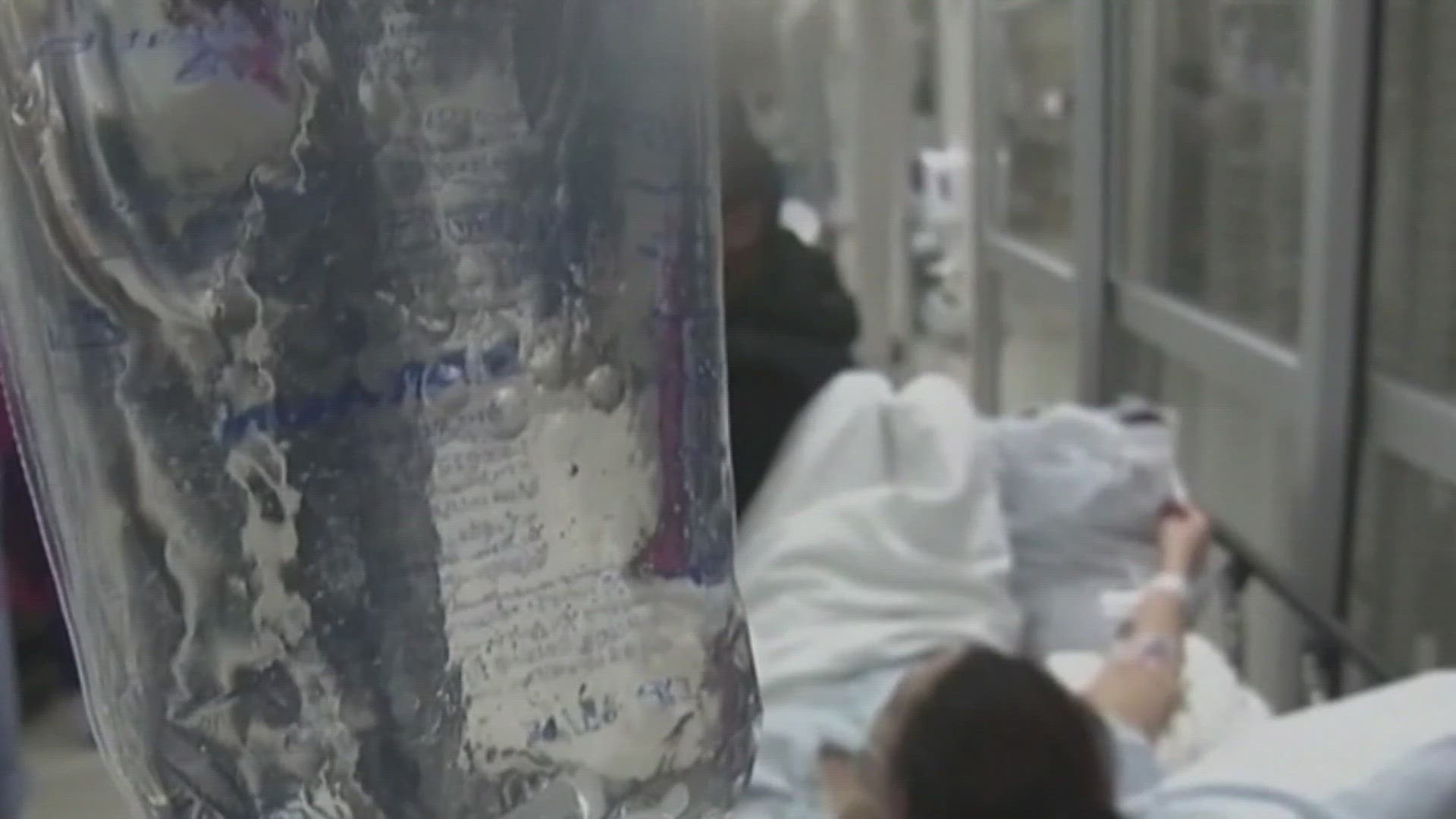CENTENNIAL, Colo — Colorado is still weeks away from broad community protection from COVID-19, but with case counts, hospitalizations and infection rates now flat or down after a fall and winter surge, there is growing public pushback being directed at the remaining restrictions to protect against viral spread.
Some of Colorado’s neighboring states, including Wyoming, Montana, Texas and Utah have already dropped mask mandates or plan to do so soon. At the same time, counties in Colorado, including Custer and Douglas, are asserting their desire to eliminate state public health orders.
>This story is powered by COLab, the Colorado News Collaborative. 9NEWS joined this historic collaboration with more than 40 other newsrooms across Colorado to better serve the public.
It all amounts to a race between restrictions fatigue, the growth of variants that could evade vaccines, and the vaccination effort itself, which is distributing about 225,000 shots per week.
For now, the mask mandate is holding in most of the state, most businesses continue working remotely, and major indoor public events like concerts, movie screenings and conventions are still on hold.
But it is a tenuous hold.
“I really, really do want to see my friends and eat at a restaurant. I’m not going to do it yet,” said Stacy Linrud of Morrison. “My husband I have agreed — we’ve made it this far, why jeopardize everything just because we’re tired of the pandemic?”
Some Colorado counties are rolling back restrictions earlier than others
Others are done waiting. Last week, Douglas County commissioners voted to ask the state to roll back all the COVID-19 restrictions.
“As a result of the drastic decreasing numbers in the COVID infection and hospitalization rates, there is no longer a need to impose measures to restrict the economy and to prohibit citizens of the State and the County to exercise their own personal responsibility to determine how best to protect their health and financial interest,” the resolution read.
It passed the three-member commission unanimously. Custer County went a step further, voting to simply ignore state restrictions from now on. It has no force of law, but the state has been reluctant throughout the pandemic to confront counties or businesses that refuse restrictive measures.
The state responded by noting that restaurant restrictions have been eased in almost all of Colorado. Gyms are re-open with precautions. The Rockies home opener will have more than 20,000 fans in attendance.
But masks are still required in public, and it’s not quite back to business as usual.
“People want to be done with the pandemic and saying ‘look we’ve got to be back to normal,’” said Dr. Mark Johnson, the longtime Jefferson County public health director who recently stepped down. He remains the county’s chief medical officer.
“I do know public health and politics are constant enemies,” Johnson said. “There are all these regulations people don’t like,” he said. “It’s not surprising at all that there's huge pushback.”
As spring weather arrives, the desire to be out among other people will likely grow
On a recent sunny afternoon in Denver, there was a breeze blowing through Washington Park. A lot of folks were out, enjoying the weather. Amy Brustkern watched her three kids fly around a basketball court on small electric cars called Crazy Carts.
Asked if now, at the end of Year One, pandemic fatigue is a real thing, Brustkern was quick to answer.
“Oh, big time. Absolutely,” she said, adding it is especially tough on the kids. “Just getting them out and doing more things (is key), because if they can't go to school full time, or if they don't have all their activities, you really have to find ways to enhance what they're doing.”
Brustkern says she’s ready to move on from coronavirus, and its many restrictions.
“We're seeing other states open up, right? And they're at full capacity in those restaurants and with the numbers plummeting,” Brustkern said. “And I really do think we are hitting herd immunity here. I believe that we should open soon and we should get back to normal.”
Not far away, retiree John Robertson pushed a granddaughter on a swing set in the park's playground. He’s tired of the pandemic too, ready for things he’s missed like “eating out, going to the movies.”
Robertson wore a red mask, with a Palm Beach, Fla., logo, that read Combat COVID. He said he moved from there to Colorado because it seemed safer here during the pandemic. He’s been vaccinated, but says he won’t be ready to go back to places he used to go “probably not for at least a couple more months.” It depends on how many people have been vaccinated “to some degree and to some degree how much (the virus) seems to be spreading, what's happening with the variants. Things like that.”
Mobility data, which tracks cell phones, is already capturing a pent-up demand to break out of pandemic prison.
“We’re definitely seeing an increase,” in people spending time out of the house, said Jude Bayham, an assistant professor at Colorado State University who tracks mobility trends.
“It definitely has to do with nicer weather,” and spiked notably this month when the weather topped 70 degrees on the Front Range.
More people are traveling again — by car and by plane
Traffic volume on the state’s highways was up to the highest levels of the year, according to Bayham. Ski resort visitation has also rebounded, and so have trips to restaurants and retailers, but they’re still short of pre-pandemic levels. The state parks department reports visits were up in January and February after a record year in 2020.
Air travel, too, appears to be primed for take-off, according to numbers from Denver International Airport. In January and February, traffic was down about 45 percent over last year. Over spring break “we’re expecting an increase in travelers,” said spokeswoman Alex Renteria. Still, DIA anticipates traffic to be down 30 percent over last year.
But from Johnson’s perspective, even with more people getting out and about, Colorado is still not quite ready to fully loosen the reins. Yes, vaccinations are happening, but he cautions transmission is still occurring at levels that would have been considered relatively high last summer. His big worry now: “a vaccine-resistant variant that spreads and overwhelms the (health) system,” like the one currently ravaging Brazil.
Johnson urges leaders to move gingerly over the coming months, and not make changes all at once. If restrictions are lifted in progression, then a community can see what impact that has on virus trends. It can move to tighter limits if things swing back out of control.
“My advice is slowly start reopening things,” Johnson said.
Pent-up pandemic fatigue can in part lead to spikes in cases and large gatherings
Though COVID-19 restrictions weren’t a stated cause of a recent violent disturbance in Boulder, several experts drew at least a dotted line between the largely maskless riot and a desire to be rid of the restrictions.
Like Johnson, Dr. John Douglas, Douglas County’s public health director, sees the Boulder riot as a sign of pandemic fatigue, of “irrational exuberance.” Now he says the governor and other community and public health leaders will need to chart a gradual glide path to reopening.
“Don’t do it too fast,” he said. “You don’t want pandemonium like in Boulder, but do it in a progressive way that both signals to the residents that we are making progress. We are at the beginning of the end, if not the middle of the end.”
Broomfield County recently had to increase restrictions after cases rose following the release of the state’s more relaxed COVID-19 restrictions dial.
“It is concerning when we start to see an upward trend,” said Jason Vahling, Broomfield’s public health director.
Broomfield has seen more cases of a variant, nine of the UK variety to date, as businesses expanded capacity with the dial change. And based on mobility data, many more people are circulating in the community, Vahling said.
Still, Broomfield saw earlier spikes that it was able to bring down. Vahling predicted the community will respond again.
“I’m not too worried about Broomfield,” he said, citing high levels of cooperation between residents and businesses, and the ramp-up of vaccinations.
More vaccines mean fewer restrictions, but we're not there yet
As more Coloradans receive the lifesaving vaccine, especially seniors 70 and older who represent 78 percent of COVID deaths in the state and do not yet have full immunity, “we will be able to relax restrictions,” said a spokeswoman with the state health department via email. She said the state would continue the work to “devolve more authority to local government as we make data-driven decisions that are best for our state and communities.”
She said when the state announced a more relaxed COVID-19 restrictions Dial 2.0 they also announced that Dial 3.0 was coming in the spring.
“We are expecting that in late March or early April. CDPHE will continue stakeholder engagement prior to this announcement,” she wrote.
Gunnison County public health director Joni Reynolds said as the pandemic response rolls on she anticipates state government will step back from taking the point to let local communities take the lead. Then the response would be asynchronous, differing county to county. That could be a bridge between now and the summer, when public health officials hope much of the population is vaccinated.
“I think in general there’s such fatigue with public health messages,” said Reynolds, who added she sees a “moral obligation” to keep up public health measures until more people get vaccinated. “It’s going to be a little messy and challenging. We’ll have to step up our messaging locally.”
With spring break coming, Colorado’s tourism office is launching a marketing campaign to urge tourists, like those from states like Texas, to follow local and state health guidelines.
'Keep the faith, hold the line for another 60 days'
A chorus of other public health experts echoed the urge for a slow-but-steady approach to win the pandemic race. Key metrics, like cases, hospitalizations, deaths and transmission have all been trending downward since last fall’s big wave, though there have been some signs of plateauing in recent weeks.
“There’s a tricky point of balance,” said Dr. Jon Samet, an epidemiologist and the dean at Colorado’s School of Public Health, who directs COVID-19 modeling for the state. ”I'd feel more comfortable if the epidemic curve, the trajectory, were a little steeper downward. But we're not in a dangerous place.”
Colorado should “keep the faith, hold the line for another 60 days,” as more people get shots, advised Robert Hecht, president of Pharos Global Health Advisors and a professor of clinical epidemiology from the Yale School of Public Health. He said to expect advice for mask-wearing to last months.
“My strong recommendation is to resist peer pressure from other states (to fully reopen now)," he said. "Move cautiously.”
Liane Jollon, San Juan Basin public health director in Durango, echoed the call for patience.
“I think there’s a lot of good news coming,” Jollon said.
Still, she cautioned, “the majority of car wrecks are in the last few miles before you get home.”
SUGGESTED VIDEOS: Local stories from 9NEWS



